If Google de-lists you. Why continue to 'Think' with Google?
First, there was Google's parent project which purchased "YouTube". This brought forth the word "Demonetization." Which was effectively telling content creators to play nice or else they make no money. Now, Google uses the "Don't be evil" Motto their developers once had and print it on the toilet paper in each bathroom stall. Alphabet/Google is not a search company anymore. They are an advertisement company (remember AOL? They were just an advertisement company too!).
This becomes more and more relevant as Google AI is deployed keeping you on the search engine instead of investigating the website itself. Or having calculative tools on Google's site instead of going to the person that made the calculator such as "millimeters to inches" as just one example. Or worse, having a Google side-project known as AMP just straight up content steal your entire site and stores it on one of their content distributed networks (CDN for short.) The next wave will affect the searchability of your favorite websites. Which is "de-listing" webmasters of low priority and content quality. Because either you're not important enough or you're not marketable enough. Or simply put. Google is panicking because the AI they used on others to perfect their search engine is being used on them by turning content into an endless array of smoke and mirrors.
Read on if you want to know more.
The art of de-listing.
This isn't a new feature to Google. de-listing or simply not indexing content comes from a variety of reasons
- If you blatantly marked your site as porn. (This in itself is a form of censorship as their search engine has no idea what their users are looking for. Yes, early porn sites were brutal with dictionary attacks to get to the TOP of the engine. But that leads into the next offense.)
- If you are spamming SEO keywords.
- If you have low-quality content (This can be very subjective)
- Link database buying and selling.
There's an article from this SEO blogger which we usually tend to distrust anyone who throws the word "SEO" into their title. But this guy talks about a dark future where Google will simply not index sites anymore. There's no real motivation for him to lie about this as it effects his business as much as any webmasters. Normally we would dismiss his claims of not indexing or worse de-listing websites as pure bullshit. It lacks any citation to where they're getting these wild conspiracy claims. But it's okay if we go off on the conspiracy tangent as well because getting a straight answer from the tech industry is never going to happen.
Proof of de-list.
Except, we have a bit of proof on this front:
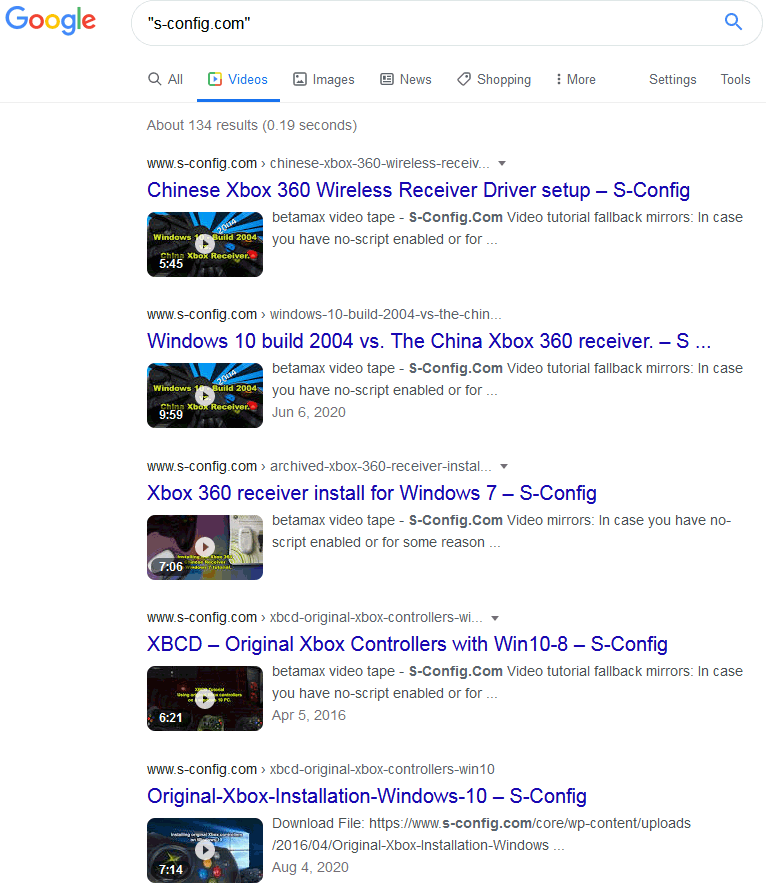
This screen capture is from 09/05/2021 when we reviewed the Presearch engine as a comparison analysis if they were doing their research vs. just following whatever Google tells them. We were kind of proud that Google was doing this allowing sites to host their videos locally instead of relying on just YouTube for search results. Especially since we typed in our domain name and immediately all of the core videos show up without issue.
Now, bear in mind the concept of how Google indexes/searches for video content is murky. There's no direct yes/no question on how to make the search engine do this. The only thing everyone tells you about this is that you need a video-sitemap.xml file for Google to use. Guess what? Here's a link to the video-sitemap.xml file! We make it ourselves because every XML sitebuilder in WordPress is lazy and assumes every blogger simply links to YouTube participating in the endless cat-and-mouse game of link breakage and 404 errors whenever they decide to change the rules of redistribution.
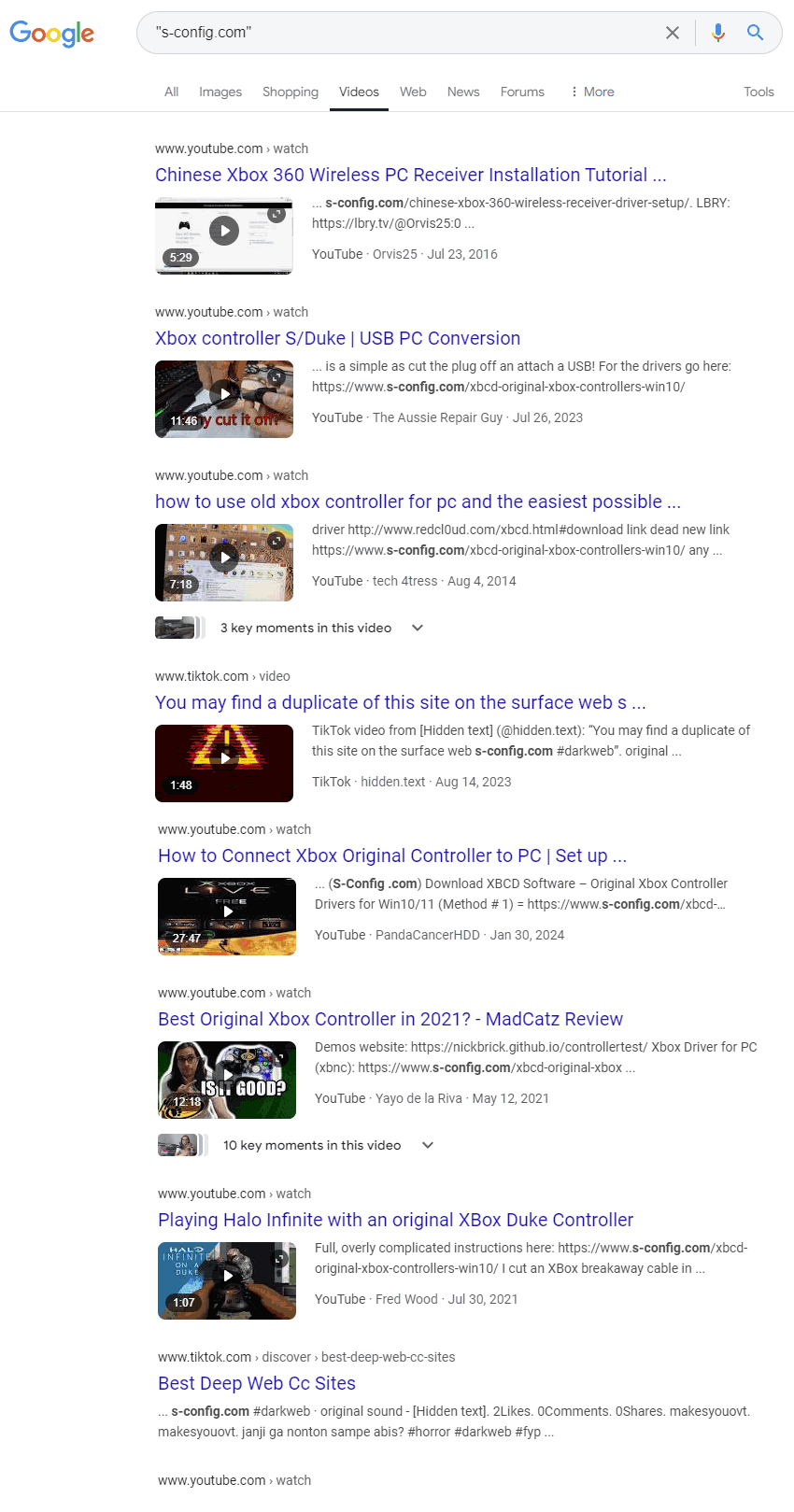
Performing this same search in 2024 reveals that any mention of videos being on my website completely obliterated. Leaving only mentions of other YouTube and (supposed)Tiktok creators (yeah, we're throwing shade on this community, don't care!) mentioning our site in their descriptions tab. Underneath each of these videos is a direct link to take you right to Alphabet's sister company YouTube. Despite having our tutorial videos on doing things. We could come up with many reasons:
- Google cannot find the sitemap-video.xml file.
- Google sees the same paragraphs of my videos as repetitive because they are not using the sitemap-video.xml file to find proper description and thus, senses all of them as "the same" and de-lists.
- Google genuinely feels threatened that anyone outside of the YouTube ecosphere can show an end-user video commercial-free. We're not basing this off of our domain but alternative video content such as searching"PeerTube" YouTube Videos show up first and foremost before after about 3 pages it shows an instance server. Or searching "Odysee" where after 3-4 pages it finally shows a handful of links to the Odysee network.
- We're asshole towards Google? Hey, we've had some harsh criticism about Google and their sister company YouTube. There is only so much criticism you can do to a corporation before they shun you off of their network.
- There's a way for people to file complaints about the content Google provides and we may have pissed off a "Karen" or two.
But without proper feedback. We'll never know. If you guys had any success on the whole indexing your site with video leave it in the comments below.
What now?
Alright, the proof isn't a whole lot. And getting an answer to "why?" is virtually impossible. There's no real outlet to "Ask Google" as Google isn't Jeevs.
Google wants to slowly cut ties with us. Perhaps we should start rethinking the rules and guidelines that Google laid upon the world. It's worked so far by rejecting AMP? Why stop there?
Starting with:
Why HTTPS?!?
Now when the internet first existed in the 90's a lot of personal sites were HTTP. In the 90s, getting an SSL (especially a wildcard SSL) was rather expensive. Still, it depends on what certificate authority you use. Nowadays there are ways to get an SSL without paying for one such as "Let's Encrypt." However, if you are going through a shared provider depending on their rules they may not support the procedure Let's Encypt is asking for.
There's a lot of good having an SSL on your website.
- Logins to accounts are (generally) safer as they're encrypted.
- You can deploy new protocols that speed up your site such as HTTP2.0 and onward which converts your data into binary and asynchronously transfers your website to a client.
- It makes anything from commerce to closed community login systems such as self-hosting a social network that much more secure.
Why NOT HTTPS?!?
Looking at this from a different direction. Having a more secure site does have negative side effects. One of them simply being that the higher your encryption. The less likely older machinery will keep up. With a lot of retro enthusiasts firing up their old browsers on 16-bit machines like Amiga, Macintosh, and even older still with commodore PCs. the total amount of RAM those systems had back in the 90s far exceeds the entire OpenSSL library. So, unless major upgrades happened to those machines. our regular https://www.s-config.com would be inaccessible with a 500 error.
Accessibility is a very important thing here. While we take strides to support the latest codecs and standards for images to reduce bandwidth. That doesn't mean we want anyone with an older machine to stop reading our site!
Also, If we were running a static website that can be only modified via SFTP or another means of security. Then HTTP is fine. The worst that a hacker would ultimately see is the 100s of spam comments for a few seconds before getting sent right into the garbage.
On top of this. If you configure your WordPress site like you would for Tor by blocking every entry point for a particular backend leaving only the clearnet SSL way to get in. It makes it even harder for someone to plain-text sniff a password prompt that never shows.
In other words: Why not set up an HTTP subdomain so old PCs can use it just like we do with Tor? That way we have the best of both worlds.
Thus, http://oldskool.s-config.com was born.
The only downside in doing this is web crawlers would view the subdomain as having identical content which could conflict or even demote your primary domain. Which if we're already being de-indexed. Why should we even care about that anymore?
About Chrome.
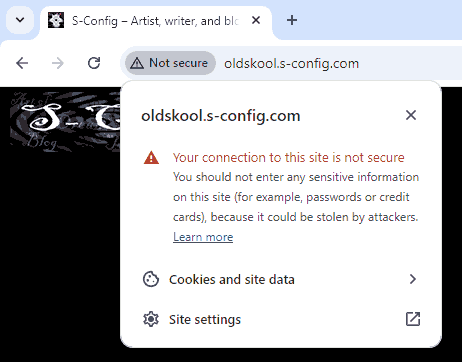
Google Chrome used to be a lot more "in your face" about these warnings by showing you a giant red prompt next to your address saying that it's not secure. Even in earlier builds putting up giant warnings that the site is not secure. Because in the eyes of Google Chrome (the most used browser on the planet with its variants there-of) HTTP sites are threats regardless of the data to may or may not even send to them.
In browsers such as Brave. there's even a plugin to always force HTTPS even if the user purposefully types in an HTTP:// address.
But guess what? Those browsers are absolutely fine with going to our main www clear-net address. The new subdomain has zero bearing on modern browsers.
Lynx vs. oldskool.s-config.com
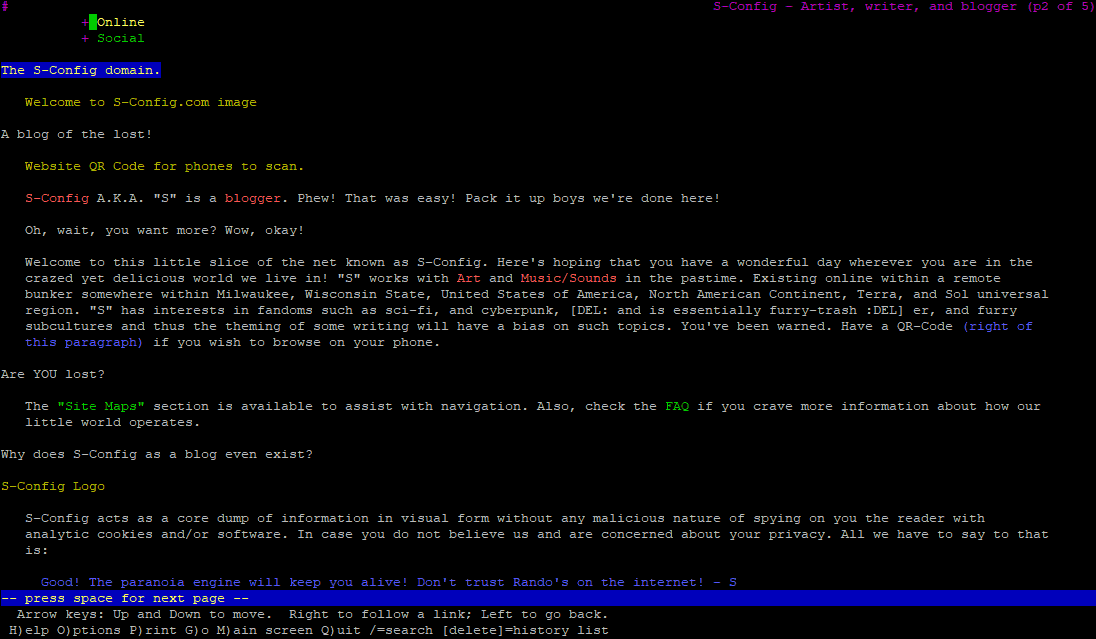
For those of a younger audience that have no idea what this is. Lynx is a text-only browser used during the 80s and 90s at universities and libraries as a quick way to look up information on the web. Didn't rely on a personal computer with a graphics card and instead deployed on a text dumb-terminal hooked up to a centralized mainframe. Many of your very early websites never really had much for imaging. If your website looks reasonably well under Lynx then chances are a lot of the 8-bit computers such as Commodore 64s will do just fine surfing raw HTTP on our site.
Can Lynx work in HTTPS mode? Yes. Newer builds work without issue. But Lynx can get a little annoying when you go to someplace like Google and it's throwing tons of tracking cookies at it. Finally, depending on an ISP's firewall. Sometimes Lynx can trigger a blacklist because it's such a basic browser that it does not report an agent ID that is considered suspicious.
There are Windows builds of Lynx for those who don't want to fire up a Linux Distro to try it out.
Netscape 1.x on oldskool.s-config.com
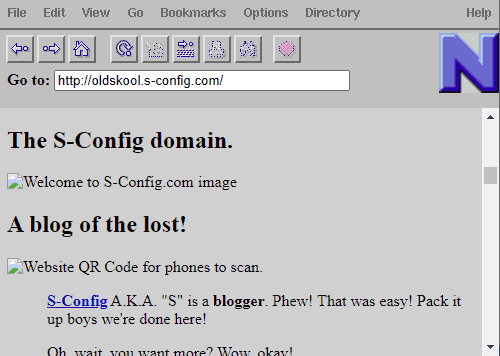
dejavu.org hosts the first generation Netscape 1.x emulator. So you too can surf like it's the early 90s. Why are all of the images broken you may ask? .JPG support didn't come around until Netscape 3.x and PNG support for Netscape 4.x (I KNOW someone will correct us if we're wrong..)
In general. because Netscape completely ignores my CSS includes. It's very similar to Lynx except with better header formatting.
Internet Explorer 2.x from the same server is very much identical to Netscape 1.x
OldWeb.Today vs oldskool.s-config.com
OldWeb.Today is an interesting site because you can take browsers from Mac and Classic Windows and put it against your site to see how it would perform (if at all). Be sure and donate some cash to those guys for giving us a glimpse into the past like this.
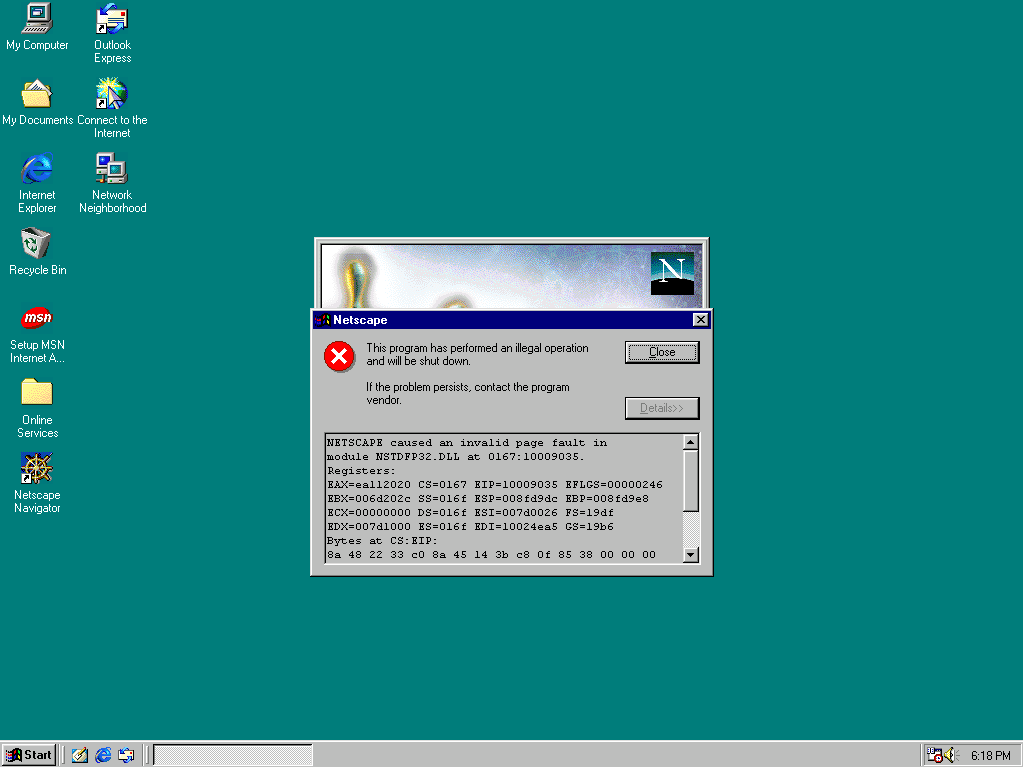
I got this error when trying to load Netscape 4 for Windows 9x. Didn't even get up to the stage of loading any web pages. So emulation isn't always guaranteed on their service.
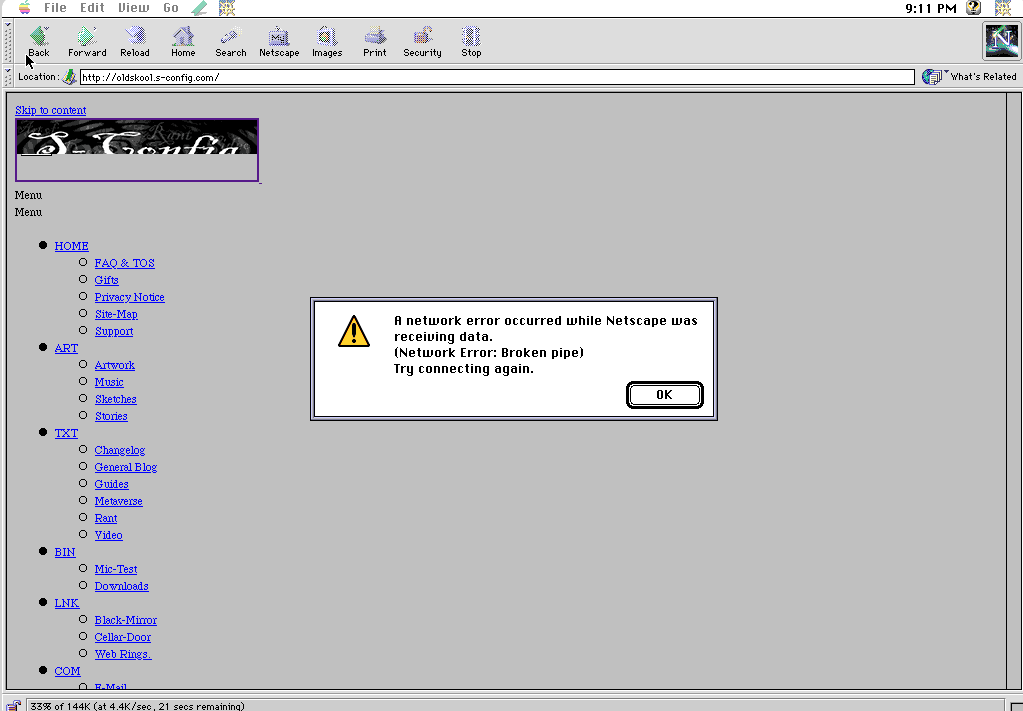
Netscape 4 for the Motorold 68xxx Macintosh was giving me broken pipe errors interestingly enough. Again, not sure if it's a configuration of the OS or if it's something my Nginx server is responsible for. Under Netscape 3.x for Mac we were getting out of memory errors like mad.
Going through Netscape 1.x was highly educational as it showed a bunch of style CSS injections that some of our plugins were doing. We've gotten many of those to stop now.
Internet Explorer version 6.x

Okay! Around IE6 we start to see some of our CSS coming through. Some of the CSS commands our WordPress is throwing around are probably way too new for it to do the cool menu collapsing bit, and during this era of computing DHTML is a better way of going versus CSS. But hey! At least it's loading without crashing.

IE6 didn't understand transparencies and certainly does not like our SVG graphic QR barcode off to the side.
All in all. STILL functional!
Mozilla Firefox 10.
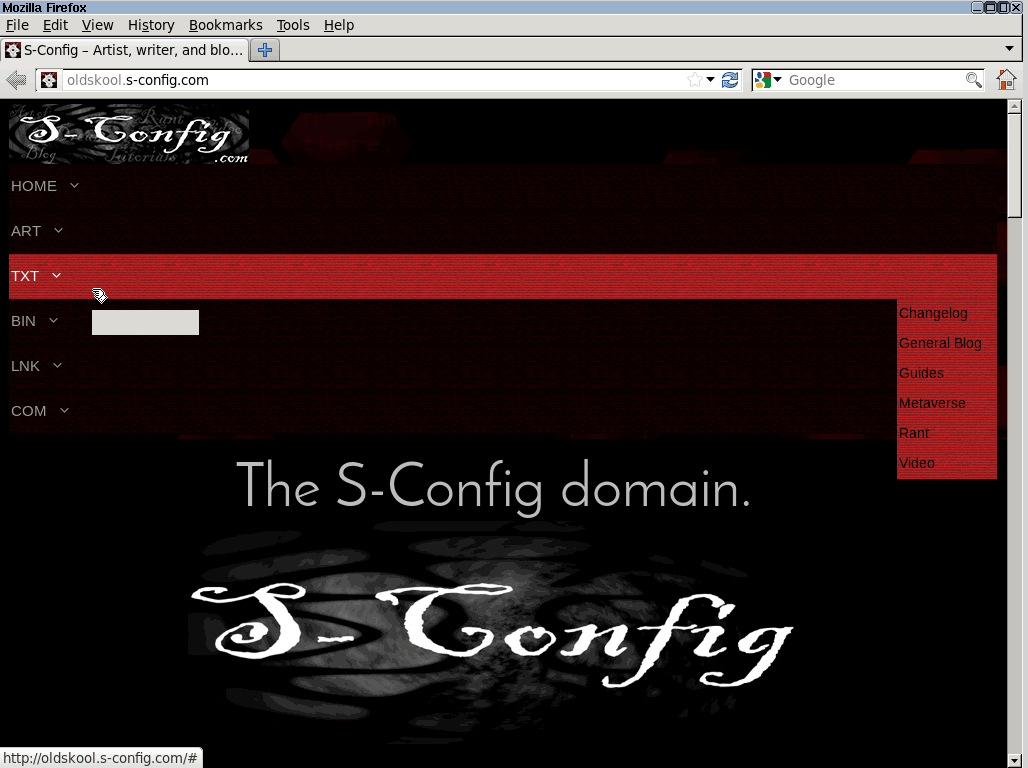
Moving on up to Mozilla Firefox 10 under Linux and although it doesn't entirely understand the responsive commands written in CSS at least the menus are collapsing and the background animations are loading.
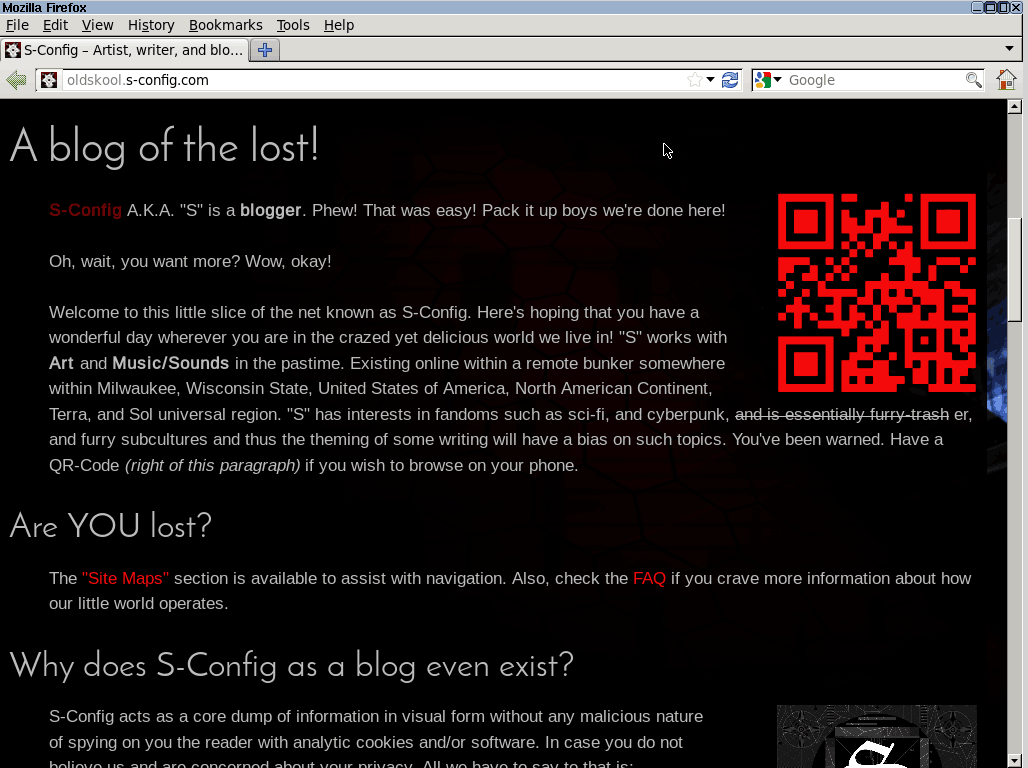
Scrolling down our page we see our custom fonts loading, SVG support is available and it understands the transparencies for background CSS images.
Old phone hardware.
Some of you may be wondering what started this blog article of looking back in the past. Sure, anyone who has been in the Information Technology field long enough has probably done so. Which is when you open up a box, or drawer of old hardware and find a relic.
There it is. My Palm Pre' We purchased this bad boy around 2010 from a Sprint store sporting WebOS. We stopped using it around 2014 when Sprint terminated our contract (and gave us $250 as they were the ones who terminated the agreement because we were costing them money keeping a plan that was so cheap) We were shocked that the lithium battery in the back didn't pillow out. (which was removable illustrating how far we have fallen in repairing our phones.) Regardless it does not hold a charge anymore so when we powered it on with the USB plug it couldn't reach out to any SSL sites.
This is probably due to the time being way off because this is a 3G phone. No more towers for the Palm Pre to communicate to. You'd think for a phone that is closely related to Linux that the moment it receives wireless connectivity it should reach out to an NTP server or something. But no.
SO! After we made our oldskool.s-config.com sub-domain. We painfully typed in our address in the barely responsive keyboard below and our site came to life!
It honors responsive design. the only thing it could not understand was the SVG barcode graphic.
The touchscreen plastics spidered the hell out. Not sure what happened there! It certainly was not like this when we put the phone away.
Bonus Round - Newish phone with weird OS?
 Although this phone works perfectly fine with HTTPS. This is also an experiment in accessibility. For reasons beyond explanation, we have a 2023 FLIP-PHONE! A Nokia N139DL with KaiOS 3.1 loaded onto it.
Although this phone works perfectly fine with HTTPS. This is also an experiment in accessibility. For reasons beyond explanation, we have a 2023 FLIP-PHONE! A Nokia N139DL with KaiOS 3.1 loaded onto it.
Typing in the wi-fi password into this brought back memories of texting using a numeric keypad. Some people could do this as fast as me typing on a regular keyboard.
Now, as for why anyone would want a flip phone in 2024? It's so you can transfer your sim card away from your $1,000 smartphone and get so black-out drunk you end up in a motel 160 miles away from your home with only a white castle close by. If this phone gets wrecked. Meh. It's just $60. If it miraculously works through your drunken adventures. You can probably call someone to pick you up.
Either way, it goes we tried out the wi-fi functionality and logged into our website and sure enough it works. SVG load. CSS is working. It's all there on a screen WAY too small to use!
Final thoughts.
We spend so much time moving forward with technology and with constant improvements in security and general blogging that we rarely bother to look behind us. We blindly accept that places like Google have to say because they are the supposed experts. It must be okay to do. Because deep down there are people that work at Google who are not evil corporate shit-bags. Some of them honestly want a better internet. Unfortunately, like our previous article about Logitech; Alphabet's leadership is taking the search engine down the wrong road. perhaps with Google closing itself off, it can guard itself against the impending AI disaster they even had a hand in themselves.
Google is slowly erasing us from their search engines. Shame on us for relying on them. We're not going to change the way we publish content either similar to what YouTube creators had to do to survive. It puts the responsibility onto us to find new communities, outlets, and readers to come visit this site. By testing new (and old) protocols we become less and less reliant on a group of people that have monopolized the way most of the North American world finds anything. After all, if all security measures are taken what is the worst that could happen? It doesn't get used? oh well then!

As mentioned in our alternative search engine article. Us opening HTTP to our site qualified a search engine that initially we were not couldn't even touch. Them adding our site to their search engine is still not guaranteed as depending on how the bot processes data it could look at our CSS syntaxes and turn its nose up at us. But at least we satisfy the base requirement of being HTTP accessible as well as being non-corporate. So we're going to apply to Wiby and hope for the best really!
Update 08/29/2024.
 HTTP://oldskool.s-config.com is now published in Wiby!
HTTP://oldskool.s-config.com is now published in Wiby!
It's the little victories that keep us going, everyone. Wiby granted our request to be on the search engine for older computers and the general older net within days. We would like to thank the Wiby administration team for this entry. We know there's a good chance Wiby will not traverse my site any further at least the home page is posted. However, we are curious as to why it shows sentences twice. Either way. Thank you.
For those who want to take your Windows 98 PC out of the closet and hook it up recklessly to the internet. You guys have an http:// site to try out there!
That's what server said..
END OF LINE+++



Hey i want to watch some videos
got most of that under the video blog section.
Hello, I would like to join you on this site.
Hello,
I enjoyed your article, although I am not a computer expert by any means.
When I was in college they were building the computer building in 1984.
I took a computer course and we were learning to write dos.
I hate google by the way. Back in the day google had a search within your search option which really helped in finding what you were looking for.
The day google discontinue this feature is the day they became and advertising agency in my opinion.
I am headed to the alternative search engines you reference in this article. I am using duckduckgo right now but it comes up with the same results as google does
so not really any help.
Can you recommend a good private and secure email provider?
Bad news on the Google front. they already are an advertising agency. If you don't pay them well! Good chance of being simple delisted.
As for a good e-mail provider. Two ways of going about it.
First way is proton mail - https://proton.me/ . A lot of people like going with them although lately there's been some drama with them trying to bring AI into the mix which in itself is a violation of privacy. Not sure if they backed down from that and it's certainly something you can ask them prior to signing up.
Another way involves a little more money. But if you shop around there's ISPs that offer space for websites for 'shared hosting' which will also offer private e-mail for a few bucks a month. The neat thing with going that route is you can link it to a domain name so your e-mail is unique at that stage. And because of the shared hosting plan. the data kept is between you and that provider.
Hello, I read your article and I think it's just swell.
I hope you can help deal with the oncoming AI issues in the future.
P.S. Loving the old school tech pics.
-the guy
Something's missing.......
Oh yeah, that's right. You didn't test it against NCSA Mosaic! Mmmhh.
Well, seeing Netrape 3 on the Slowtorola Macintrash sure brought back memories of junior high. My school district was flooded with Quadras and Power Macs running System Software 6. And that (and later, NetScrape 4) was the go-to browser until Micros~1 Foundation grants started flowing in and the first Hell SubOptiplex GX100s with 98SE and Idiot Exploiter 6 started popping up.
Thanks for the memories!
(bangs around in closet trying to find CD with Basilisk HFS hard drive image with System Software 7.6.1 68K)
Shit, your right.. I didn't try NCSA Mosaic!!!
no problem man! when the image on that website started to crash i was tempted to see if my HP Vectra 7 still has 98 on it.
Anyhow. thanks for check us out!
- S
Dear writer,
I hope this message finds you well.
I have a few brief questions regarding your article. I noticed your discussion about Google and its operations, which was quite insightful. However I'm curious are the other tools we use online really that different from Google? I don't mean to sound rude but, it seems to me that, at the end, everything is interconnected. For instance, I've heard that even the TOR browser, which is often considered private, might have connections with the FBI (and correct me if I'm wrong), allowing them to monitor our online activities.
Could you possibly suggest an alternative to Google?
I would really appreciate any insight you could provide.
Thank you very much for your time.
Best regards,
N.
Hello N,
In the words Lain "No matter where you go. Everyone's connected"
I've already published an article about alternative search engines. As for the FBI. Although we have no direct contact with that particular department. And setting aside the pure speculation of that claim. We don't think it matters. Because Tor is a lot like visiting downtown Manhattan in the US. At the street level, you have a lot of shady ass people selling you bootleg or illegal shit. But moving beyond that, there are people like us who use it as an alternative protocol. And there's a lot of readers that simply exist on the Tor network. Because Tor on its design level loaths automation because it can be manipulated and hacked. It means the public sites are all based off of word of mouth from other operators. Because there are humans that get vetting these public addresses from the crap on the streets. You end up with curated hubs similar to web-rings that provide quality links to sites.
By the way if the FBI/CIA is reading this. We know you have an onion address too as well as clear-net addressing. If you guys want to host a link exchange. Let us know.
- S
"Now, as for why anyone would want a flip phone in 2024? It's so you can transfer your sim card away from your $1,000 smartphone and get so black-out drunk you end up in a motel 160 miles away from your home with only a white castle close by."
Promise me you will take photos of the White Castle adventures with the flip phone's 5MP Rear Camera.
Your post has me all nostalgic for old devices, but also, now I want to test my site to see how awfully "backward compatible" it is.